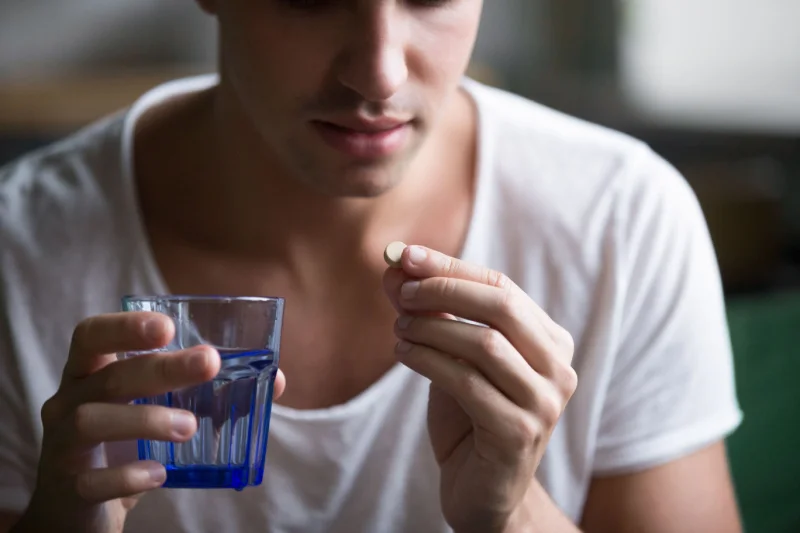Understanding Adderall Addiction
When taken as prescribed by a doctor, Adderall is found to be safe and legal. However, as a Schedule II substance, Adderall has a high potential for misuse, physical and psychological dependence, and can lead to Adderall addiction, also known as stimulant use disorder.
The high potential for misuse makes it essential to understand the signs of Adderall addiction so you know when to seek recovery.
Why Do People Take Adderall?
When taken as prescribed by a doctor, Adderall can help treat attention-deficit/hyperactivity disorder (ADHD) and sometimes narcolepsy, as approved by the Food and Drug Administration (FDA). Adderall can help people increase their attention span and decrease impulsivity and hyperactivity. It’s usually taken as part of a complete treatment plan that may include counseling and other types of therapy.
People sometimes misuse Adderall for:
- Feelings of euphoria (known as a “high” or “rush”).
- Feelings of clarity.
- Feeling more confident and in control.
- Feeling more capable of social interaction.
- Feeling more energetic with less need for sleep.
Adderall, like some other prescription stimulants, is sometimes called a “study drug” because people use it to stay more alert and awake so they can study or enhance performance. This type of misuse can lead to Adderall addiction.
What Is Adderall Addiction?

“Adderall is a highly addictive drug, and it can be easy to develop a dependence on it. Once someone is addicted to Adderall, they may find it difficult to stop taking it, even if they know it is causing problems in their life,” says psychiatric mental health nurse practitioner (PMHNP) Valerie Puffenberger.
Adderall addiction, or stimulant use disorder, happens when a person’s continued use of Adderall causes problems like health and relationship issues and inability to fulfill daily responsibilities.
Adderall misuse occurs when a person takes it at higher doses than prescribed, takes someone else’s prescription, or takes it to achieve a rush or high. Misuse can also include using it by crushing it to snort or dissolving Adderall in water to inject.
Prescription stimulants can lead to tolerance and dependence, particularly if a person misuses them for a long period at high doses. Tolerance is when a person’s body adapts to the presence of the drug in their system, resulting in increasingly higher doses to feel the same desired effects.
A person with Adderall addiction will have withdrawal symptoms if they suddenly stop or significantly reduce how much Adderall they’re taking.
Signs and Symptoms of Adderall Addiction
Only a doctor can diagnose stimulant use disorder. However, knowing the Adderall addiction signs and criteria doctors use to diagnose it may help in identifying if you or a loved one is misusing Adderall.
Doctors use the Diagnostic and Statistical Manual of Mental Disorders, 5th Edition, to diagnose various disorders, including addiction. If you or a loved one experiences at least two of the following criteria within a 12-month period, you may want to contact someone about Adderall addiction treatment:
- You take Adderall in larger amounts or over longer periods than you intended.
- You have a desire or unsuccessfully tried to reduce your Adderall use.
- You spend time doing activities to obtain, use, or recover from the effects of Adderall.
- You have Adderall cravings or a strong desire to use it.
- You fail to meet obligations because of continued Adderall use.
- You continue using Adderall despite its negative effects on interpersonal relationships.
- You give up social, occupational, or recreational activities because of your Adderall use.
- You continue using Adderall in situations that could be physically dangerous, such as driving.
- You use Adderall even though you have ongoing physical and/or psychological problems.
- You develop a tolerance to Adderall.
- You develop a physiological dependence on Adderall.
Can You Overdose on Adderall?
Yes, a person can overdose on prescription stimulants like Adderall. An Adderall overdose happens when a person takes enough of the prescription stimulant to result in potentially life-threatening effects or even death.
The signs of a prescription stimulant overdose are:
- Restlessness.
- Tremors.
- Rapid breathing.
- Overactive reflexes.
- Aggression.
- Hallucinations.
- Confusion.
- Muscle pain and weakness.
If you believe someone is experiencing an Adderall overdose, call 9-1-1 immediately.
Adderall Addiction Treatment Options

If you or a loved one is struggling with Adderall addiction or misuse, treatment may be an important next step in getting help.
Puffenberger recommends finding a support group, setting realistic goals, and being patient with yourself as you navigate treatment. There will be ups and downs on your road to recovery. But you can overcome them with the right resources and support.
Detox is often an important first step in the recovery process. People who have used stimulants for a long time may be particularly susceptible to severe withdrawal symptoms. Medically supervised detox can help alleviate these symptoms while also improving your chances of long-term sobriety.
Recovery from Adderall addiction should include a personalized treatment plan to address a person’s specific needs and substance use. An Adderall addiction treatment plan may include:
- Counseling.
- Behavioral therapy, like cognitive behavioral therapy (CBT) and contingency management.
- Mutual help groups, like 12-step programs.
If a person has co-occurring mental health disorders, treatment should also address those.
Treatment settings can include inpatient or outpatient rehab, depending on the severity of a person’s Adderall addiction. Inpatient programs are more intensive and require the patient to live at the treatment facility. Inpatient rehabs are more disruptive to the patient’s life, but they are usually more effective at treating addiction than outpatient rehabs.
Outpatient programs do not require patients to live at the treatment facility, though they must still attend treatment sessions multiple times a week. Outpatient programs allow patients to maintain some normalcy in their everyday lives but may not be as effective as inpatient rehabs.
There are no FDA-approved medications to treat a stimulant use disorder like Adderall addiction. Research continues to try to identify medications to use during treatment and recovery from Adderall addiction.
Overcoming Adderall Addiction
If you or a loved one is struggling with Adderall addiction or misuse, getting treatment can be an important first step in starting on a new path.
At Legacy Healing Center, we take a holistic approach to treating addiction by focusing on the mind, body, and spirit. With the right combination of medication management, therapy, and aftercare, we can help you on the path to recovery from Adderall addiction.
Call us at 888-534-2295 today for more information on Adderall addiction treatment options.
Adderall Addiction FAQs
What are the signs of Adderall addiction?
Adderall addiction signs vary from person to person and typically include signs included in the DSM-5 criteria, such as forming a tolerance, Adderall cravings, unsuccessful attempts to quit, and negative impacts on your responsibilities and relationships due to Adderall misuse.
What are the treatment options for Adderall addiction?
Treatment can vary depending on the severity of the addiction, the presence of co-occurring mental health disorders, physical health, and other factors. However, treatment for Adderall addiction generally includes:
- Detox – The period during which you taper off the drug and experience withdrawal symptoms.
- Inpatient rehab and/or outpatient rehab – Can include behavioral therapy, group therapy, and other treatment methods to help you cope with triggers and form new habits to improve your chances of maintaining long-term sobriety.
- Aftercare – Can include joining a support group, like Narcotics Anonymous
What steps can be taken to recover from Adderall addiction?
If you are struggling with Adderall addiction, talk to your doctor or a mental health practitioner, or contact a treatment facility like Legacy Healing to learn about treatment options.
Sources
- Food and Drug Administration. (2007). Medication Guide Adderall XR.
- Sharbaf Shoar N, Marwaha R, Molla M. Dextroamphetamine-Amphetamine. (Updated 2023, May 23). In: StatPearls [Internet]. Treasure Island (FL): StatPearls Publishing; 2022 Jan.
- National Institute on Drug Abuse. (2018). Prescription Stimulants Drug Facts.
- U.S. Drug Enforcement Administration. (n.d.). Drug Scheduling.
- Stimulant Related Disorders. Diagnostic and statistical manual of mental disorders: DSM-5 (5th ed.). (2013). Washington, D.C.: American Psychiatric Association.
- Shoptaw, S. J., Kao, U., Heinzerling, K., & Ling, W. (2009). Treatment for amphetamine withdrawal.
- The Cochrane database of systematic reviews, 2009(2), CD003021.
- National Institute on Drug Abuse. (2020). How Can Prescription Drug Addiction Be Treated?





